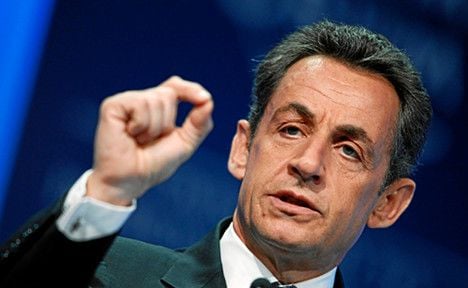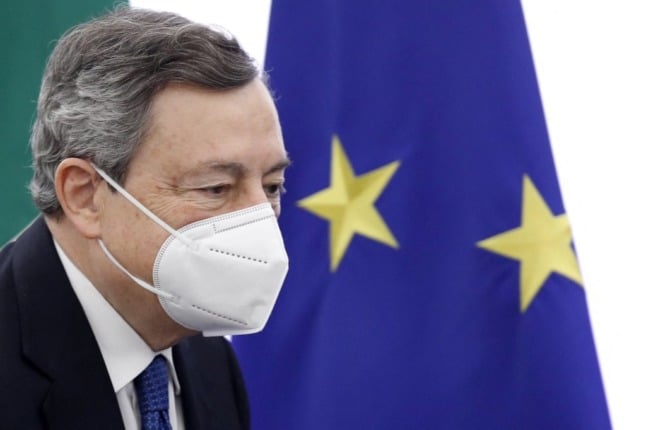With hours to go before the EU summit in Brussels, German Chancellor Angela Merkel and French President Nicolas Sarkozy were hoping to rally support at a meeting of conservative EU leaders in the French port of Marseille.
Paris and Berlin are desperate to win backing for their plan to amend EU treaties to impose budget discipline and streamline decision-making to prevent debt woes from spreading through the 17-member eurozone.
Ahead of the summit, officials made it clear just how much was at stake.
“The situation is serious… the euro can explode and Europe unravel,” France’s minister for European affairs, Jean Leonetti, warned on French television.
“The entire world is watching. We must do everything” to save the euro, European Commission chief Jose Manuel Barroso told reporters in Marseille, where a summit of the European People’s Party brought together conservative leaders.
“It is extremely important that we all together, all the EU, show that the euro is irreversible,” he said.
The Franco-German plan would impose stricter fiscal rules including legal or constitutional limits on deficits and automatic penalties for eurozone nations that overspend.
It also proposes a “new, common legal framework” to boost financial and labour market regulation, the harmonisation of the corporate tax base and the imposition of a tax on financial transactions.
The summit is facing tough obstacles, officials said, including Germany’s refusal to embark on anything short of a full treaty change and British demands for protection of its vital financial services industry.
Piling on the pressure, ratings agency Standard & Poor’s on Wednesday put a number of large European banks on review and placed the European Union on watch for a downgrade of its AAA credit rating – just days after it issued an identical warning to nearly all eurozone countries.
S&P’s chief economist for Europe, Jean-Michel Six, said however that the agency was not working on the basis that the eurozone will break up.
Amid fears the eurozone’s woes could trigger a global economic downturn, US President Barack Obama spoke by telephone with Merkel on Wednesday, urging a “lasting and credible solution” to the crisis.
In Milan Thursday for talks with Italy’s Prime Minister Mario Monti, US Treasury Secretary Timothy Geithner, who spent the week meeting with European officials, backed the new leader and his recently unveiled austerity programme.
“I think we can be encouraged and the world can be encouraged at the progress of these last few weeks,” Geithner said.
Germany poured cold water on hopes for the summit on Wednesday, with officials warning that talks would be “difficult” and expressing pessimism.
Prime Minister David Cameron also made it clear that Britain intended to seek a high price for supporting euro nations.
“The more that countries in the eurozone ask for, the more we will ask for in return,” he told parliament. He threatened to veto any treaty change if Britain failed to receive “safeguards” from its European partners, particularly for the City of London financial services hub.
Fellow non-eurozone member Sweden also said treaty changes were not the solution markets want.
“I don’t think that’s the solution markets following us are actually looking for,” Swedish Prime Minister Fredrik Reinfeldt said in Marseille.
“The markets are looking into if we get enough firepower in the firewall and if we do enough when it comes to increase fiscal discipline and also reforms in the most troubled countries,” Reinfeldt said.
The EU talks have also focused on finding ways to bolster the eurozone’s financial firewall, with possibilities including allowing two rescue funds to exist temporarily side-by-side instead of just the single bailout fund currently in existence – the European Financial Stability Facility (EFSF).
Leaders have warned that if the 27-nation EU cannot reach a deal, the eurozone could go it alone.
“I will not accept that when it comes to financial services, Britain reserves rights and freedom of action for itself that others will not have,” Luxembourg Prime Minister Jean-Claude Juncker, the head of eurozone finance ministers, told France Info radio.
“If ever within the 27 there are countries which do not want to accompany us in looking for this better architecture, we will reach a deal within the 17,” he said.
Merkel, along with Sarkozy and European Central Bank chief Mario Draghi, plus three other senior eurozone figures, will stage their own negotiating huddle ahead of the Brussels summit starting at 7:30 pm (1830 GMT).
The ECB was meanwhile set to cut its key rates for the second time in two months just hours ahead of the summit, in a bid to ease pressure on eurozone borrowing.
New chief Draghi cut rates by a quarter of a percentage point last month and analysts expect a similar move when the ECB’s decision-making body holds its monthly interest-rate meeting Thursday, bringing borrowing costs in the euro area down to just 1.0 percent.
European stocks mostly rose as traders looked ahead to the ECB’s decision, but Asian markets slipped on fears the summit will fail to deliver a conclusive deal.
A group of European labour leaders meanwhile released a public letter urging officials not to forget the “social dimension” in talks.
“We believe that the modification (of treaties) cannot have as the only objective to put constant pressure on national budgets and reinforce austerity,” the union heads wrote.



 Please whitelist us to continue reading.
Please whitelist us to continue reading.
Member comments